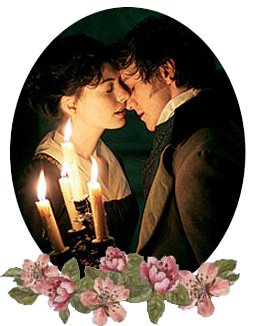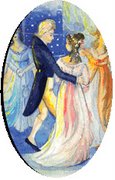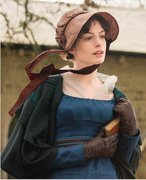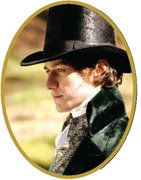‘Robin Adair’ in ‘Emma’: Jane’s lament for Tom Lefroy?
 I’ve been meaning to find the lyrics of Robin Adair when I stumbled across a paper by Alexander (1988) titled ‘Robin Adair’ as a Musical Clue in Jane Austen’s Emma. My dear friend Sitta obtained the electronic paper for me; hence I can post this article (thanks a lot Sitta!).
I’ve been meaning to find the lyrics of Robin Adair when I stumbled across a paper by Alexander (1988) titled ‘Robin Adair’ as a Musical Clue in Jane Austen’s Emma. My dear friend Sitta obtained the electronic paper for me; hence I can post this article (thanks a lot Sitta!).
As Emma readers are aware of, Robin Adair was a song Jane Fairfax played in Miss Bates’ house, observed among others by Frank Churchill and Emma Woodhouse. Frank behaved as if he and Jane had nothing to do with each other, though actually he and Jane were secretly engaged. In my earlier post about ‘breadcrumbs’ in Emma, I suggested that Frank Churchill (and Mr. Dixon as well) was actually the representation of Tom Lefroy, and that Jane Fairfax was a bit of Jane Austen herself (not unlike Anne Elliot in Persuasion). With this assumption, I look back again at the conversations between Emma and Frank Churchill in Vol. II Chapter 10, where Frank just returned from Jane who was playing the pianoforte, teasing her about the married Irishman Mr. Dixon. Emma felt rather uncomfortable for teasing Jane about the possible flirtation between the governess and Mr. Dixon.
Emma: “But really, I am half ashamed, and wish I had never taken up the idea.”
Frank: “I am very glad you did, and that you communicated it to me. I have now a key to all her odd looks and ways. Leave shame to her. If she does wrong, she ought to feel it.”
Emma: “She is not entirely without it, I think.”
Frank: “I do not see much sign of it. She is playing Robin Adair at the moment – his favourite.”
The Penguin edition of Emma (2003 edition) notes that Robin Adair was a popular 18th century Irish song, though sometimes referred to a Scottish song as well. The song was found in the first volume of the Irish Melodies under the title ‘Eileen Aroon’, very popular in Gaelic Scotland and
This is the lyric of Robin Adair from Alexander’s paper:
Robin's not near.
W'hat was't I wish'd to see?
W'hat wish'd to hear?
Where's all the joy and mirth
Made this town a heav'n on earth?
Oh! they're all fled with thee,
Robin Adair.
What made th'assembly shine?
Robin Adair.
What made the ball so fine?
Robin was there.
What, when the play was o'er,
What made my heart so sore?
Oh! it was parting with
Robin Adair.
But now thou'rt cold to me,
Robin Adair,
But now thou'rt cold to me,
Robin Adair.
Yet him I lov'd so well
Still in my heart shall dwell;
Oh! I can ne'er forget
Robin Adair.
What made th'assembly shine? Robin Adair: An Irishman that had left the lamenting girl alone. Of course, it’s easy to recall that Jane Austen and Tom Lefroy, an Irishman, danced several times during village assemblies. And because in 1814/15 Jane had lost communication with Tom, she would think Tom as ‘cold’ to her. Yet, she can never forget him, her own ‘Robin Adair’.
Peter Alexander closed the short but interesting paper with:
It is wholly characteristic of the care which Austen lavished on Emma that not even so small a detail as this should be wasted. Had Jane Fairfax sung the song at the point in the novel when she feels herself forced to dissolve the engagement with Frank, the reference to 'Robin Adair' would have seemed to some readers almost crudely obvious; placed as early as it is, however, it becomes just one more thread in the gossamer, and one so fine as to be easily overlooked.
Although Alexander 'only' referred to Robin Adair as the song performed by Jane Fairfax, and hence his analysis focused solely on Jane Fairfax's love story with Frank Churchill, I agree with him in the notion that Jane Austen was a sheer genius; she inserted her own references inside her novel, so subtle that it would be easily missed. Only to me, the Robin Adair reference does not only involve Miss Fairfax and Mr. Churchill; it also refers to Jane Austen and Tom Lefroy.
Reference:
Ashton, H. 1968, Parson Austen's Daughter, Collins, London.
Austen, J. 1815, Emma (2003 edition), Penguin, London.
Pic 2: Frank Churchill and Jane Fairfax, Emma (1996), from Boots and Bonnets
Pic 3: Frank Churchill and Jane Fairfax dancing, Amicus Productions Canada
Pic 4: Robin Adair musical sheet (acknowledged as a Scottish music) from the guitarnut.com















































5 comments:
One thing I hate about being on holiday is internet cafes ... but then, the deal with holidays is to get away from regular life ... Anyway! I digress.
Fantastic posts! I am mid re-reading Emma and I will keep this observation in mind. I'm leaving this page open and will go home and re-read and then be back with (hopefully) some more thoughts/questions.
It's been said that Jon Spence's Becoming Jane Austen is the book that "many readers will secretly wish they had written" (http://www.jasa.net.au/books/spence2.htm)
Well, that is exactly how I feel about this blog. :) It is exactly what I would have created (wished to exist), yet I get to enjoy it without the effort and hard work. How lucky and rare is that?!?! Thank you so much for your in-depth and intelligent posts.
When I googled "BJ" after watching the movie, I expected to find raving/squeeing fansites which are rampant on the net. This one is a revelation. Keep it up!
Gotta run, running out of credit. Ergh!
LOL! I forgot we have a musician here! Hope you like that music sheet... it should be applicable for the piano? I hope so, at least.
Let me know how you go with Robin Adair later ;-)
And thank you so much Michelle for your sweet thoughts of the blog. It's so nice to have friends like you. Enjoy the lake!
Hi Icha! Yes, the lake is gorgeous, and nothing quite like it for clearing your mind and encouraging peaceful thoughts. :)
When I get home I will print out Robin Adair and let you know how it is. The copy you provided is written for the piano, on two staves.
On the topic of music, I brought a large collection of soundtracks with me on holiday - being the perfect opportunity to relax and really listen. I was listening to P&P 2005 (the music is the best thing about this adaptation, IMO), and was thrilled to hear a tribute/variation on Purcell on track 8: A Postcard to Henry Purcell. I thought of you, because I could hear "Hole in the Wall" going on. There was probably other Purcell work alluded to, but Hole in the Wall was the only one I recognised. :)
Back to your post (must read part two) - I COMPLETELY agree with your final paragraph. Jane Austen IS a genius. I read Colleen Sheehan's Emma articles last week, and was delighted at Austen's genuis and wit. She must've been an absolutely charming woman. I find it exciting to know that if she did it once (illusions/references/etc) she certainly did it again, and this will make re-reading her novels over and over again magical.
The references to The Prince of Wales in Emma are gorgeous. Obviously, some 200 years later, we have to work harder and research to understand the culture of the day in order to fully appreciate and discover the references - but this is exciting! I can only imagine what it would have been like to have been one of Austen's contemporaries reading her work...
Hi Michelle, I hope you're happy with the music CD &c now. I will try to scan Radovici again, for some friends are also asking about it (well, I did invite them), and my first scan was a crap that never got through the email. Arrrgh! Pray for my success!
Oh yeah, I love Sheehan's articles, and also Arnie's. Made me see Emma differently now, especially after I saw some hints there myself.
Post a Comment